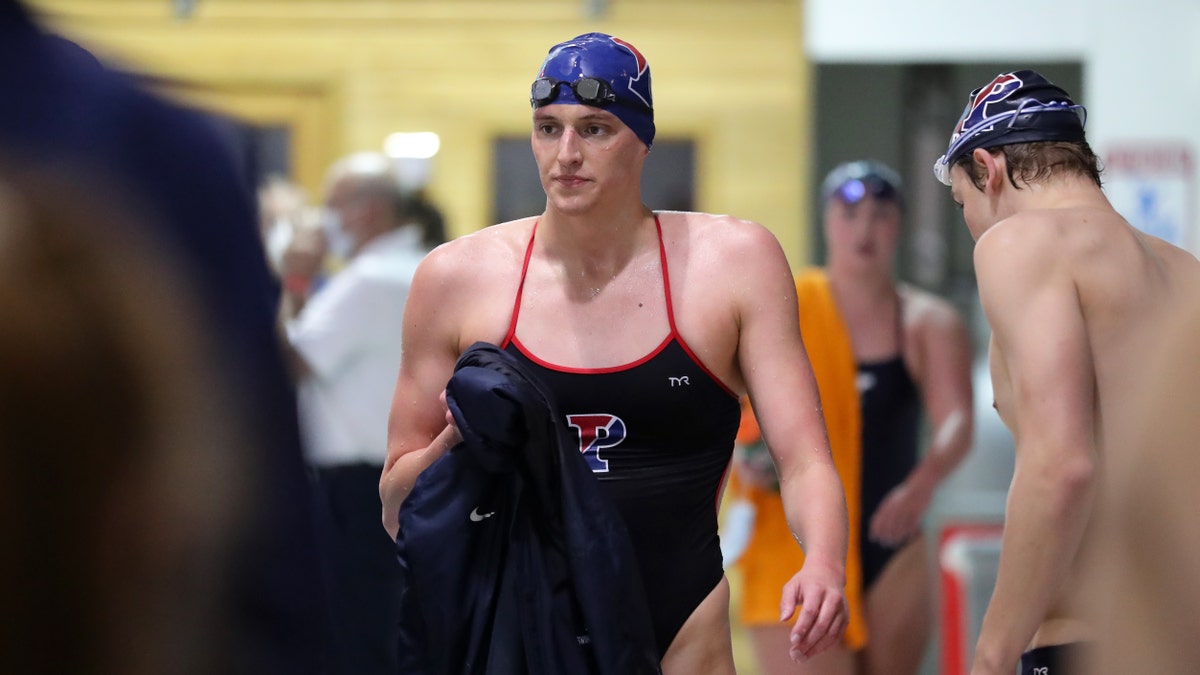Caitlyn Jenner reacts to new NCAA transgender policy: 'Woke world gone wild'
Former Olympian tells 'America Reports' the NCAA only 'kicked the can down the road' with its new policy.
EXCLUSIVE: The father of a female swimmer on the University of Pennsylvania team said his daughter and many of her teammates are coming to the sobering realization that they "will never make it" to the winner’s podium as long as transgender swimmer Lia Thomas is still on their team.
"She is most likely going to be representing you and I and all other Americans at the Olympics," the father, who has a medical background, said of Thomas during an interview with Fox News Digital.
TRANS WOMEN ATHLETES HOLD COMPETITIVE EDGE, EVEN AFTER TESTOSTERONE SUPPRESSION, SCIENTISTS SAY

Penn's Lia Thomas after winning the 500-meter freestyle against Yale and Dartmouth at the University of Pennsylvania on Jan. 8, 2022, in Philadelphia. (Hunter Martin/Getty Images)
The father spoke on the condition of anonymity out of fear his speaking out on the issue could bring "actual physical harm" to his daughter and family. He said others aren’t speaking out because they feel like "there's nothing they can do about it. They are stuck."
"Part of the reason these little girls get so excited about this is because they see themselves possibly being [at the Olympics]," he said. "There's a shot that they can do it if they swim hard enough, if they work hard enough, they got it, they can do it. Anybody can do it."
"But now what do you say to your daughter? You got Lia up on the blocks, taking a spot from a cisgender woman on the Olympic team," he continued. "How do I tell my daughter that could be you one day? You can’t. You can never be her."
"Yes, your daughter can still participate in athletics and reap a lot of the benefits of athletics, but she'll never be on the podium," he added.
The National Collegiate Athletic Association (NCAA) sparked a firestorm last week after updating its more than decade-old policy on transgender athlete participation and taking a sport-by-sport approach to transgender participation, which aligns with recent policy changes from the U.S. and International Olympic Committees and allows each sport’s national governing body to determine its own policy. In Thomas’ case, the governing body is USA Swimming, which said it is still awaiting new directives from the International Swimming Federation (FINA) concerning trans athlete participation.

Lia Thomas of Penn smiles after winning the 200-yard freestyle against Yale and Dartmouth at the University of Pennsylvania on Jan. 8, 2022, in Philadelphia. (Hunter Martin/Getty Images)
The NCAA policy previously required trans women athletes to undergo at least a year of testosterone suppression treatment before competing on a women’s team. Now, it will require testosterone testing starting with the 2022 winter championships, in which transgender student-athletes will have to document sport-specific testosterone levels beginning four weeks before their sport's championship selections and at designated points throughout the 2022-23 academic year.
Thomas, who competed on the men’s team for three years before switching to the women's team in 2020, has been receiving testosterone suppression treatment for nearly three years. It is unclear whether the new policy will affect her standing, as she is slated to compete at next month's Ivy League championships and has already qualified for the NCAA Division I championships in March.
The NCAA’s rule change came amid growing concerns about the future of women’s sports in light of Thomas’ meteoric rise on Penn’s women’s team. Thomas has turned in better times this season than several college swimmers who raced in last summer’s Olympics, according to the New York Times, and she recorded the nation’s fastest times in the 200- and 500-yard freestyle last month.
The College Swimming & Diving Coaches Association of America (CSCAA) issued a statement proposing a temporary fix ahead of the championships, calling on the NCAA’s Competition Oversight Committee to expand this year’s participation cap by one spot so that Thomas "and the other cisgender women athletes who have earned the right to compete" can do so.
LIA THOMAS: UPENN SWIMMER'S PARENT 'FURIOUS' OVER TRANSGENDER ATHLETE'S RISE
Thomas’ cisgender teammates are "very upset" about the situation, the father who spoke with Fox News Digital said, and the girls are starting to "realize that they will never, ever be able to beat this person."
"My daughter hates it. She doesn’t think it’s fair," he said, adding that while his daughter hasn’t personally lost opportunities to compete, "other girls have and will, because the coach is going to take the swimmers that score the most amount of points for the team."

Penn's Lia Thomas gets ready to compete against Yale and Dartmouth at the University of Pennsylvania on Jan. 8, 2022, in Philadelphia. (Hunter Martin/Getty Images)
The dad also wanted to make clear that the criticism isn’t rooted in transphobia or bullying, but in the spirit of protecting fairness in women’s sports.
"All the swimmers like Lia, she’s a wonderful person and very nice," he said, adding that Thomas has been "nothing but polite" about the situation.
"Lia’s not doing anything against the rules," he said.
But he said the current focus on testosterone levels is "woefully inadequate" and "shortsighted," and that there are many different hormonal differences between men and women that must be recognized in sports policy.
"There are so many other hormones that are different in women and men, just like a protein like collagen," he said. "Collagen is responsible for strength in tendons and ligaments, and it’s responsible for joint stiffness, it’s responsible for all sorts of things. And men and women have completely different levels of the three major types of collagen. So, even with a testosterone limit, the man is going to have an advantage because of his collagen levels and the types of collagen that he has."
He said there’s also a real fear that Thomas will wipe out collegiate records held by Olympians Katie Ledecky and Missy Franklin during the NCAA championships, which are set for March 16-19 at the McAuley Aquatic Center in Atlanta.
"Lia is going to go to the NCAA’s and she’s going to take down Katie Ledecky’s record, she’s going to take down Missy Franklin’s record, and it’s not because she is an exceptional woman," he said. "It's not because she is the pinnacle of female athletics, which Katie Ledecky and Missy Franklin are."
"It’s a very difficult situation," he said. "It has not been good for the team. I can't imagine what it's doing for recruiting for the future teams."

NCAA headquarters in Indianapolis (AP Photo/Michael Conroy, File)
The father's comments echoed similar sentiments from another Penn women's swimming parent, who told Fox News Digital in an interview last week that his daughter and "a good number" of her teammates believe the rules are unfair, and that there's been a lot of "crying on the pool deck" over the situation.
Critics of the current rules argue that athletes like Thomas should be placed in a separate category for trans athletes, or that competitions featuring a trans athlete should be designated as "exhibition contests," which has to be agreed to by both competing institutions and would mean their times would not count as records and their place would not count as team points.
CLICK HERE TO GET THE FOX NEWS APP
Others have called for another spot to be added at the championships, like the CSCAA, or for the male category to be changed to "Open" and for the women’s category to be "Female," where female refers to the sex recorded at birth.
Their reasoning is that multiple studies have shown in recent years that transgender women athletes who went through a typical male puberty during adolescence still hold a competitive edge over their biologically female competitors, even after undergoing several years of testosterone suppression therapy.





